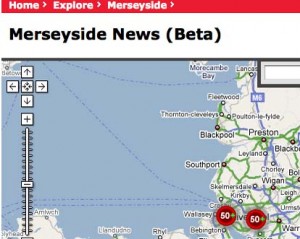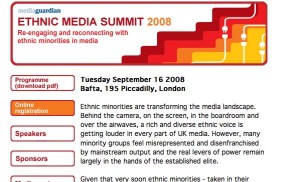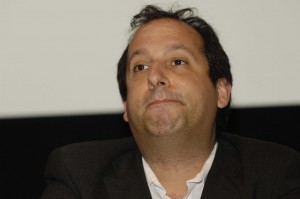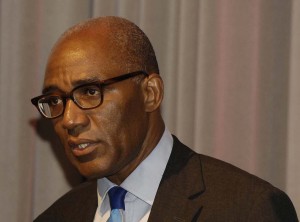This week saw the launch of a hyperlocal news map for the Liverpool Echo, as announced by Sly Bailey at the AOP Digital Publishing Summit (follow link for report in MediaGuardian).
It geotags news content so each user can search for news by postcode.

Nothing new there, web-savvy newshounds might think, but actually it is:
Though Archant announced plans for geotagged sites last October (it started with Jobs24 – a winner at yesterday’s NS ADM Awards – and Homes24 and has plans to roll out geotagged news content in 2008) to date we’re still waiting for the official launch of geotagged news.
Yesterday we reported that American site outside.in will be launching in the UK, which will link news with local areas (as localised as users specify). Outside.in thinks its opportunity has come about as a result of:
“The demand for personalized information on the web, and the failure of the newspaper industry to capitalize on featuring hyperlocal content” (Nina Grigoriev, outside.in)
Journalism.co.uk thought it was time for a bit of a run-down on the development of geotagging in the UK.
First, what is it?
Journalists record the locations referred to in each story and add their postcodes as metadata when uploading their copy to the web.
In that way, geotagged content allows users to prioritise the news they see online according to postcodes.
Where are we at in the UK?
The Liverpool Echo is the first site (of the large publishing groups) to do so in the UK. Although other sites have incorporated mapping into their sites, no other places has successfully incorporated news content as well.
The BBC plans to invest £68 million across its network of local sites, which will be decided upon by the BBC Trust in February 2009. Online Journalism Blog reported a sneak preview in January 2008, though the BBC have since asked us not to refer to the sites as ‘hyperlocal’.
Critics such as Trinity Mirror’s CEO, Sly Bailey, have voiced concerns over the BBC’s local video proposals, saying they will provide ‘unfair competition’ for the regional media.
Northcliffe is also developing geotagged content on its revamped thisis sites, and told Press Gazette in June the process has been difficult: “Because not all stories affect only one specific point, the company is finding geocoding challenging,” Hardie said.
According to the article: “The localisation functions will remain hidden until journalists have built up enough stories with postcode data.”
Back in July 2007 we saw reports of Sky geotagging its news, but it hasn’t developed at the same speed or as widely as in the US.
What’s happening in the US?
Everyblock is developing fast across the US. It’s a new experiment in journalism and data, offering feeds of local information and data for every city block in Boston, Charlotte, Chicago, Los Angeles, New York, Philadelphia, San Francisco, Seattle and Washington, DC, with more cities to come. Not in the UK yet, but watch this space.
Elsewhere, the Washington Post has used outside.in’s maps for their own site, while the New York Times’ Boston.com (the online Boston Globe) uses MetaCarta’s geographic search technology for maps.
So, what does this mean for UK based geotagging?
With the arrival of highly efficient US based sites such as outside.in (who said an UK based office is a possibility) maybe it’s time for Archant, Trinity Mirror and Northcliffe to get their skates on before it’s too late.
Please send us your examples of UK based geotagged content, from formal publications or otherwise, as we want to track it as it expands in the UK.
(Then we can make a geotagged feed and map of geotagging in journalism. Then our heads might explode)


